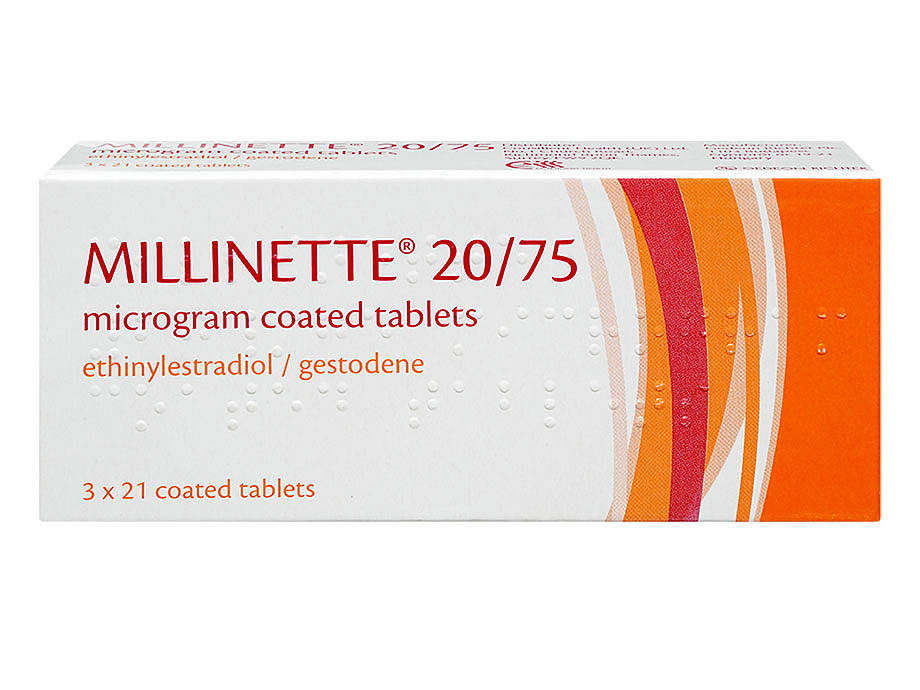




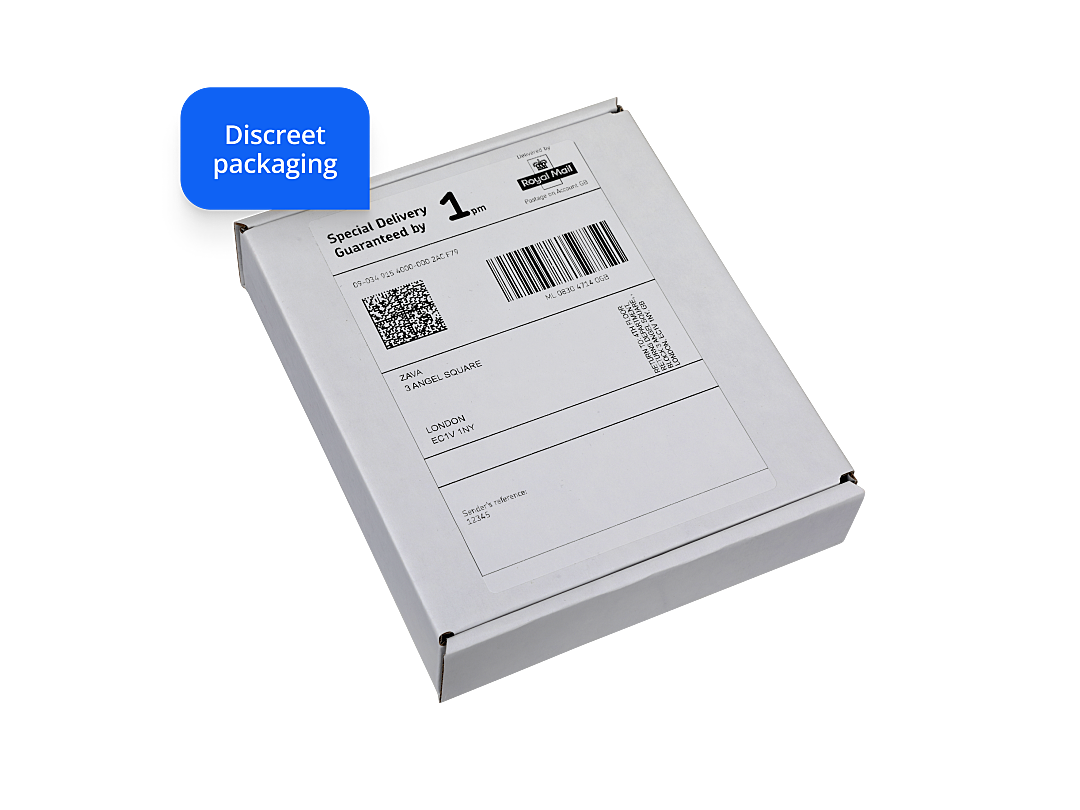

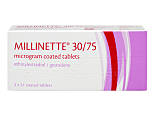

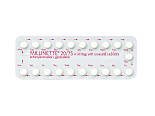
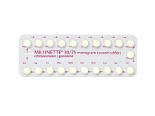

Prices from £15.99
In stock. Simply fill in a brief consultation questionnaire and one of our doctors will review your request today.
-
Millinette is a combined hormonal contraceptive pill. It will help prevent you getting pregnant with a success rate up to over 99%. It can also be taken to treat some period-related problems.
Millinette comes in two doses. A low dose pill (20/75) with less chance of side effects and a standard dose pill (30/75) that helps reduce period-related problems.
Prices
6 x 21 tablet(s) - £26.00
3 x 21 tablet(s) - £18.00
6 x 21 tablet(s) - £22.49
3 x 21 tablet(s) - £15.99



About Millinette 20 & 30
-
-
Millinette is an oral contraceptive pill, also known as a combined hormonal contraceptive (CHC), or ‘the Pill’. It is usually taken by sexually active women who don’t want to become pregnant.
Millinette contains two types of hormone – ethinyl estradiol (oestrogen) and gestodene (progestogen). Together, these hormones prevent you from getting pregnant in three ways:
- By stopping your ovaries releasing their monthly egg (ovulation).
- By thinning the lining of the womb, so a fertilised egg can’t attach there and develop.
- By thickening the fluid (mucus) found at the neck of your womb (your cervix), which makes it difficult for sperm to reach the egg to fertilise it.
Studies show that, only about 1 in 100 users of Millinette become pregnant from unprotected vaginal intercourse. This means that Millinette is around 99% effective in preventing pregnancies.
-
-
Reviews of Millinette say it’s useful for preventing pregnancy.
Millinette is 99% effective in preventing pregnancies when taken correctly. It becomes less effective if you regularly miss a pill, or forget to take several pills over time.
The Pill isn’t always taken perfectly. One academic study from the US found that about 30% of women reported missing at least one pill per month. However, those who regularly miss or forget to take their pills are three times more likely to become pregnant than those who take it properly.
-
-
It is quite normal to experience mild side effects when taking a CHC pill like Millinette. Changes to your weight, mood, and spotting (bleeding between periods) are the most commonly reported side effects of the contraceptive pill.
However, if you ever experience any severe or unpleasant side effects, you should seek immediate medical advice from your doctor. Your doctor may tell you to switch to another pill or a new form of contraceptive.
Millinette is not right for everyone. There is usually some amount of trial and error involved when using the Pill for contraception. The most important thing is to find a contraceptive that you are comfortable with, is convenient to use, and has the smallest number of negative side effects.
As with all medicines, there is a chance that you will get side effects as a result of using Millinette.
Less common side effects (1 in 100 users) include:
- migraines
- changes to your appetite
- increased blood pressure levels
- skin rashes (like nettle-rash, or chloasma)
- changes to hair growth (hair-loss, or increased hair growth)
- lack of interest in sex (loss of libido)
Other, rare side effects can include:
- allergic reactions
- jaundice (yellowing of the skin)
- increased level of interest in sex (raised libido)
- the development of blood clots (like deep vein thrombosis or pulmonary embolism), strokes, or heart attacks
- liver damage
Even though these aren’t frequent side effects, they can be very severe. If you experience any of these, it’s very important that you seek medical advice as soon as possible.
-
-
The best way to know for sure if taking Millinette is right for you is having a consultation with a doctor or nurse.
There are some contraindications. This means that there are some people who shouldn’t take Millinette for health reasons. You might not be able to take Millinette if you have:
- high blood pressure (hypertension)
- a history, or high risk of developing blood clots (like deep vein thrombosis or pulmonary embolism)
- diabetes
- a history, or high risk of liver damage or breast cancer
- regular migraines or migraines ‘with aura’
- problems with your immune system (like angioedema)
- severe depression or mental health differences
- a higher BMI
- a current or recent smoking history
Millinette can also interact with other medicines. This means that taking Millinette at the same time as other medicines could make either medicine less effective, or lead to unpleasant side effects or health complications. You shouldn’t take Millinette if you are taking the following medicines:
- Ciclosporine (a medicine taken after transplant surgery)
- Some epilepsy medication (like barbiturates, carbamazepine, primidone, or lamotrigine)
- Some treatments for HIV, and Tuberculosis with Hepatitis C infections
- Some arthritis or arthrosis medications (like etoricoxib)
- Some fungal infection medications (like griseofuflvin)
- Some asthma medications (theophyllin)
- The herbal remedy St. John’s Wort
- Emergency contraceptive pills containing Ulipristal (EllaOne) can interact with Millinette. If you need to take it, make sure you follow your doctor’s advice on the precautions you need to take
Speak to the doctor who is prescribing you a new course of medicines if you are currently taking Millinette. They may advise that you use an extra form of contraception (like condoms) during the course of treatment and possibly for some time after.
-
-
Millinette is a prescription drug, which means that you can only collect it from a pharmacy after getting a prescription from a licensed doctor.
If you are already taking Millinette, you can get a repeat prescription and order your contraceptive pill online using an online doctor service like ZAVA.
Your doctor will first ask you for some relevant details of your medical history, about your current lifestyle choices, and if you are pregnant. From this information, they will decide whether or not Millinette is a suitable contraceptive choice for you.
-
-
Take Millinette:
- Once a day
- The same time every day
- By swallowing it whole, with water
- For 21 days in a row
- Up until the 21-day mark, then take a 7-day break. This break can be skipped for as many cycles as you wish. Whenever you decide to take a break, make sure it’s not longer than 7 days and that you’ve been taking the pill for at least 21 days beforehand
One of the biggest advantages of taking a CHC like Millinette is that it’s very easy to use. Your prescription for Millinette will give you packets of 21 pills. Try to start your first packet of pills on the first day of your monthly period, or follow your doctor’s instructions if switching to Millinette from another form of contraception.
Millinette is an oral contraceptive pill, which you should swallow whole without chewing or crushing the tablet. You should take one pill per day for 21 days in a row, at around the same time every day. After 21 days, you can have a 7-day ‘break’ when you take no pills.
During this break, you are likely to experience a ‘withdrawal’ bleed, which will look and act a lot like your usual monthly period. After this 7-day break, start all over again on your next packet of 21 pills.
If you want to avoid your monthly bleed, it‘s perfectly safe to skip this break period by running your packets back-to-back. Some women prefer to take the pill continuously, without ever taking a break. This is also perfectly safe. Ask your doctor if you’re unsure about this, or you need more information.
-
-
If it‘s been less than 24 hours since you missed your dose of Millinette:
- Take the forgotten pill as soon as possible and continue tomorrow as usual
- You will still be protected against pregnancy
If it’s been more than 24 hours since you missed your dose of Millinette:
- Take your missed pill as soon as you remember, even if this means taking two pills in one day
- Continue taking your daily pills at the usual time, but use another method of contraception (like condoms) if you have sex over the next 7 days
- If you had unprotected sex during the week before forgetting your pill, there’s a risk of getting pregnant and you might want to consider taking emergency contraception
If you’re sick (with diarrhoea or vomiting) up to 3-4 hours after taking your daily Millinette pill, the hormones may not have been properly absorbed into your body, and your contraceptive protection could be reduced. Follow the advice above for missing a pill (more than 12 hours), and use other contraceptives if you have sex in the following 7 days.
-
-
There are many different contraceptive pills and it’s important that you’re familiar with them so you can choose the one that best suits you.
If you’re not considering getting pregnant soon, you might find other contraceptive methods more suitable.
There are contraceptive methods that don’t have to be taken every day that give an excellent contraceptive protection and are only active while you use them. These are known as long-acting reversible contraception (LARC) and include:
- the implant (progesterone implant)
- the progesterone injection
- the intrauterine device (IUD)
- the intrauterine system (IUS, or hormonal coil)
You can discuss these and non-hormonal methods with your GP, as these are offered in most GP surgeries or at family planning clinics.
-
-
Millinette comes in two different doses – 20 µg and 30 µg of the hormone oestrogen. Although Millinette 20 and Millinette 30 contain different levels of hormones, they both provide you with the same level of contraceptive protection. Both can prevent you from getting pregnant, when used correctly.
The main difference between Millinette 20 and Millinette 30 is that there are usually less side effects associated with Millinette 20 µg, because it contains less hormones. If you find that you often have trouble with side effects when taking the Pill, Millinette 20 is probably the most suitable one for you. However, although not all women will have it, it’s slightly more frequent to have some spotting (irregular light bleeding) than with Millinette 30.
Millinette 30 may have a higher risk of side effects, but it has stronger, non-contraceptive benefits as well. These can include:
- improving acne
- reducing heavy periods
- reducing premenstrual symptoms
-
-
- Headaches
- Irregular bleeding (or ‘spotting’) between periods
- Vaginal infections (like thrush)
- Mood swings (including depression and anxiety)
- Nausea and dizziness
- Acne
- Breast swelling or tenderness
- Painful periods

Dr Laura Joigneau Prieto joined ZAVA in April 2018 as a clinical doctor. She studied medicine at the Universidad Autónoma in Madrid, Spain, and at the Pierre and Marie Curie Faculty in Paris, France. She did a Master’s Degree in clinical medicine in 2009 at the Rey Juan Carlos University in Madrid.
Meet our doctorsLast reviewed: 02 Mar 2019
-
FSRH Guideline Combined Hormonal Contraception, Faculty of Sexual and Reproductive Healthcare [accessed February 2023]
-
Combined pill, National Health Service [accessed February 2023]
-
Ethinylestradiol with gestodene, NICE/British National Formulary [accessed February 2023]
-
Millinette 20/75 pill reviews, The Lowdown [accessed February 2023]
-
The Combined Oral Contraceptive (COC) Pill, Patient [accessed February 2023]
Contraceptive pills are a reliable way of reducing your risk of getting pregnant from sex. ZAVA offers most common brands of pill, so you can order your preferred brand by visiting our contraceptive pill service page.
In stock. Prices from £15.99








